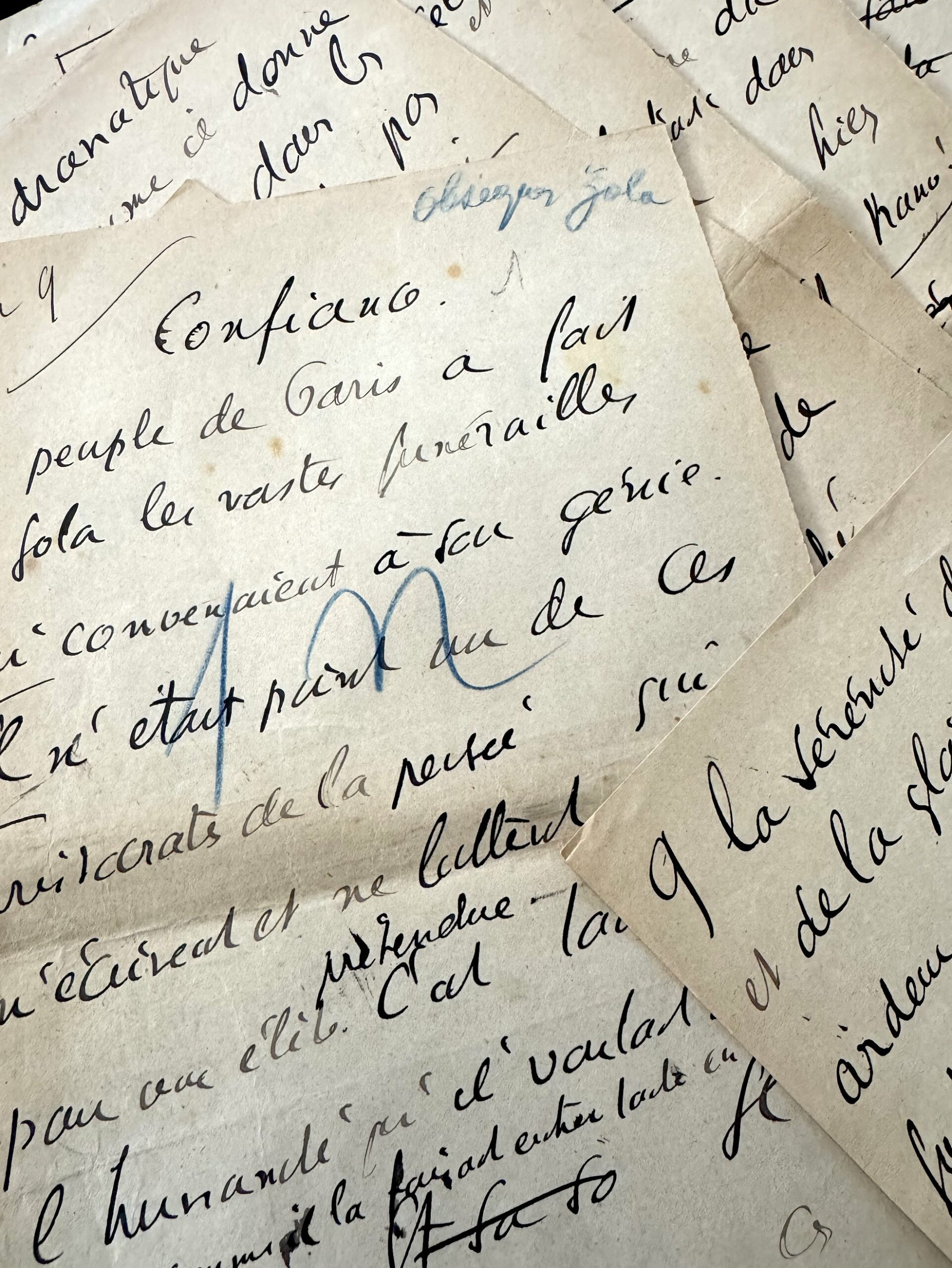Jean Jaurès (1859.1914)
Autograph manuscript signed – Trusted.
Nine folio pages (310 x 200 mm) on paper with frayed edges.
Typographical annotations in grease pencil.
[Paris. October 6, 1902]
« The people of Paris gave Zola the grand funeral befitting his genius.
____________________________________________________
Autograph first draft manuscript of the article written by Jean Jaurès in homage to Émile Zola, the day after the writer's funeral.
Having died of asphyxiation in his sleep, in circumstances that have still not been definitively established, Émile Zola was buried on October 5, 1902. The article appeared on October 7, 1902, in La Petite République, the daily newspaper of which Jean Jaurès was a leading figure. It was the main organ of the socialists before the creation of L'Humanité. (The writer's body was transferred to the Panthéon on June 4, 1908.)
A central figure in the Dreyfus Affair thanks to his thunderous "J'accuse," which exposed the conspiracy to the public , Émile Zola was dragged into court and convicted. Then at the height of his literary fame, thanks to the success of his Rougon-Macquart when he became the leader of the Dreyfusards , Zola died before Captain Dreyfus was exonerated. To avoid any unrest, Madame Zola and the Prefect of Police suggested that he not attend the writer's funeral: "Anatole France made it known that he would not speak at Zola's graveside if Dreyfus was absent" (Jean-Denis Bredin). He therefore attended.
Jean Jaurès, the newly elected socialist leader (May 1902) and still a journalist for La Petite République . Although he was not convinced of Captain Dreyfus's innocence from the outset of the Affair, he nevertheless became another essential figure in the Dreyfusard struggle, gradually drawing in the socialists, overcoming the anti-Semitism of a segment of the left, before ultimately being the architect of the 1906 revision of the verdict.
____________________________________________________
The people of Paris gave Zola the grand funeral befitting his genius. He was not one of those intellectual aristocrats who write and fight only for a supposed elite. He wanted to call all of humanity to joy, just as he brought it all into his work. In his later years, it was not enough for him to have opened thousands upon thousands of consciences to the truth. It pained him to think that there still remained among the people dark strata where the light had not yet penetrated. May this shadow of sadness dissipate. Yesterday, it was the multitude of humanity that, by its eagerness to attend the funeral, attested that it had understood.
What a dramatic spectacle, and how it vindicates those who, in dark times, refuse to despair. The man who was yesterday. It was in the name of an entire people yesterday. It was in the name of an entire people that the representatives of the Republic, of art, of free thought, glorified the man whom, only recently, the powerful persecuted and the humble misunderstood.
In the friendly crowd that pressed behind the coffin, there was the one whom Zola saved , snatched from the forgers and executioners ; and when Anatole France, in admirable language, glorified the writer's efforts to save the innocent, Alfred Dreyfus listened; he relived his suffering and stoic life, the individual drama of which now merges with one of the highest tragedies of human conscience.
Anatole France's generous anger, the great fighter who has passed into death , still resonated yesterday in the words of Anatole France! Serenity. The serenity of death . It is the privilege of noble causes that they can assert themselves near a coffin without disturbing the serenity without offending the gravity of death. When a man has fought for paltry interests, one cannot , without a kind of profanation, prolong the echo of these sordid struggles into death. But when he has fought for humanity, for justice, for truth and for right , and when criminals still dare to persist in their lies and their crimes, truth has the right to retain, even in death, its angry and proud accent.
It is not our fault if it is impartial and implacable history that spoke yesterday. It is not our fault if, in order to finally pierce the thick layer of the crime of folly and lies, the light is forced to sharpen its rays like...
Anatole France recalled the beautiful myth , the ancient symbol: and to finally pierce the thick veil of the crime of folly and falsehood, the light of truth sharpened its rays like arrows. Thus, in the serenity of death and glory, the magnificent fervor of the struggle for justice continued. Jean Jaurès.


